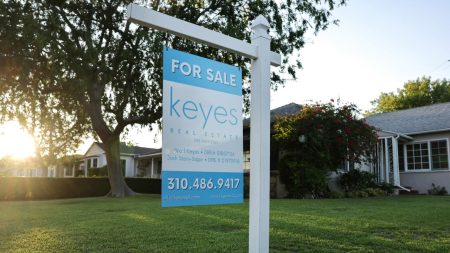A rising number of consumers say lenders are rejecting their loan applications. What’s more, record-breaking shares of people expect lenders to keep saying no on mortgage applications, car loans and bids for credit-card increases well into 2024.
This is according to new survey data out from the Federal Reserve Bank of New York. It adds to the picture of an economy where consumer credit is tightening at a time when more people are stretched out by rising prices and rising interest rates.
It’s getting particularly hard for people with low credit scores to land a loan right when they are increasingly searching for financing, the Fed’s figures released Monday show.
Nearly 22% of all people who applied for a loan said they had been rejected as of June. That’s just shy of a rejection rate last seen in June 2018. The record rejection rate was just over 24% in October 2014. New York Fed researchers have been asking consumers about their access to credit since 2013.
The denial rates are rising across the board for mortgages and mortgage refinances, car loans, new credit cards, and increases in credit-card limits. The lower the credit score, the louder the “no.”
Almost 57% of people with credit scores at 680 and under say they were rejected for a loan from early to mid-year. That’s up from nearly 46% of people with scores at that credit score range in February who said they were turned away.
In scores between 300 and 850, a score at 680 hovers at the lower range of a good score, according to Experian
EXPGY,
A prime credit score is around the 670-740 range while a “super prime” score is 740 or higher, the credit bureau said.
A record-breaking share of people said they were rejected for car loans. Of car-loan applicants, more than 14% said they were denied. That’s up from a roughly 9% rejection rate in February’s results and topping the previous record 11% rejection rate.
Since early 2022, more people have been turning to credit counselors for help after loan rejections, said Barry Coleman, vice president of program management and education at the National Foundation for Credit Counseling.
The organization has more than 50 nonprofit member agencies helping people with their finances. Clients come to agencies after a rejection seeking to understand what went wrong, Coleman said.
“They are trying to use credit to help make ends meets. That’s why they are out there seeking it. They feel confident they can take on more debt, but they are having to take on more debt to cover the necessities,” he said.
It’s a complicated time for personal finances when hot inflation is cooling and the job market is strong — but many people are still feeling pinched and uncertain about the economy’s next move.
The New York Fed’s latest release includes the aftermath of Silicon Valley Bank and Signature Bank’s early March closures. At the time, experts expected lenders to become more sparing with consumer credit. Loan officers already said they were tamping down on consumer credit, and the trend intensified after the bank turmoil.
It’s not surprising that consumers with lower credit scores will experience higher rejection rates when credit tightens. But numbers could tell a bigger story while recession worries nag.
When lenders are more confident about the economy’s future, they are more comfortable extending loans — albeit at higher rates — to people with lower scores, said Quincy Krosby, chief global strategist at LPL Financial. That’s because they are confident that applicants will find the jobs and the money to repay, she said.
So if lenders pull back altogether, that could be a message about the economy and not just the creditworthiness of one person.
The rising loan rejection rate “could be a reaction to the bank problems that we had back in March. But it also could be a reflection of the expectation that the economic backdrop. … could begin to weaken, despite the fact the labor market remains strong,” Krosby said.
What can be done?
Consumers are skeptical about their chances for loans in the coming 12 months, the New York Fed data said. If someone considered applying for a car loan in the coming 12 months, nearly 31% thought they’d be rejected. If someone thought about an increase for their credit-card limit, over 42% estimated the answer would be no. For people considering mortgages, nearly half, 46%, anticipated a future rejection.
Those are new highs on the expected rejection rates for those loans, researchers said. In that gloomy outlook, people with credit scores at 680 and lower were the most likely to say they’d still be applying for credit.
Many potential loan applicants will be under more pressure 12 months from now. Federal student-loan payments resume in October after a break of over three years.
“Certainly, there may be some things outside an individual consumer’s control. At the same time, there are things within consumer control,” Coleman said.
To make their best shot at a loan in the near future, Coleman advises people to focus on what’s controllable. That includes making a budget and staying in it, repaying debts regularly and keeping revolving debt — like a credit-card balance — to a minimum.
These are “basic best practices when it comes to managing personal finances,” Coleman said. Generally, it can be six months to a year before those positive results can start to improve a score, he said.
“Follow those best practices to keep control of your financial situation, to make yourself more attractive to lenders in the future,” Coleman said.
Read the full article here















